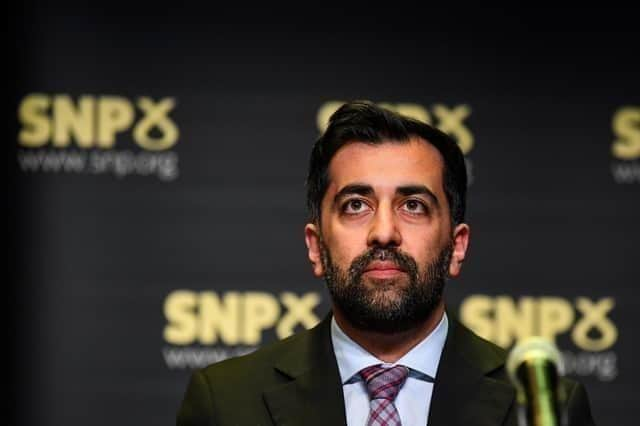Will Humza Yousaf's Programme for Government tell us what the First Minister stands for?
What exactly does Humza Yousaf stand for? What drives him? What defines his political philosophy and what does he want to achieve in power, other than advancing the cause of Scottish independence?
These are questions on the lips of many Holyrood watchers. And we may soon get some answers.
Advertisement
Hide AdAdvertisement
Hide AdOn Tuesday, the First Minister will deliver his Programme for Government, setting out his policy plans for the year ahead. It will be a crucial moment. Mr Yousaf’s time in office has been dominated by the ongoing police investigation into the SNP’s finances. This is a chance to seize the agenda.


Geoff Aberdein knows more than most about the importance of such events. As a former adviser and chief of staff to Alex Salmond, he spent years at the heart of power.
"I don't think you can define what Humza stands for yet, which is why set-piece opportunities like the Programme for Government are so, so important,” Mr Aberdein told The Scotsman. "We will start to get – and by ‘we’, I mean the general public – an idea of what he truly stands for.”
Mr Yousaf faced a grilling from Mr Aberdein during a live recording of the Holyrood Sources podcast last month, with the First Minister accused of lacking conviction. In reply, Mr Yousaf insisted the Programme for Government would make it “completely clear” where he stands on a number of issues, and mentioned the climate emergency. “I will be choosing sides because that's what you have to do and frankly that’s going to p*** off some people,” Mr Yousaf added.
A source close to the First Minister said much of the recent focus in Holyrood had been on policies that have not come to fruition.
“Whether it’s gender recognition reform, the deposit return scheme, or even indyref2, you could say, probably other things as well – they are things that actually haven’t, for one reason or another, happened,” they said. "I would say the importance of Tuesday is about just trying to basically have a more grounded political agenda, about what the Government is actually getting on with and what is going to be delivered.”
Despite being seen as the continuity candidate during the SNP leadership election, it didn’t take long for Mr Yousaf to rip up chunks of his predecessor’s policy agenda once in office. As well as scrapping Nicola Sturgeon’s independence strategy, he ditched plans for highly protected marine areas and took a controversial consultation on alcohol advertising back to the drawing board.
He has also sought to build better relationships with business leaders. Policies targeted at firms and entrepreneurs are expected to feature in Tuesday’s statement.
Advertisement
Hide AdAdvertisement
Hide AdElsewhere, Mr Yousaf has indicated there will be an announcement on delayed plans to dual the A9. This is a key issue for Fergus Ewing, a former SNP minister who is now an outspoken backbencher and vocal critic of the party’s power-sharing agreement with the Greens.
Mr Ewing told The Scotsman he wants the Programme for Government to include an apology for past failures to meet targets. He also wants details of when the dualling of the A9 and A96 will be completed and how this will be funded, as well as the full disclosure of all advice to ministers and officials.
Mr Aberdein said he believed there should be a strong focus on sustainable economic growth. "We've had a lot of positive noises in recent weeks, particularly about the business community and his willingness to listen,” he said. “We'll find out pretty soon whether he has listened, and whether the different requests and demands of the vital business communities have been listened to.
"I do think, in fairness to Humza, he has a strong focus on ensuring that Scotland is a fairer country, and there will be, I'm sure, a lot of social policies in there. What I think people want to see, though, is the other side of the balance sheet – how these things are going to be effectively paid for, which doesn't necessarily impinge on Scotland's ability to be a competitive environment for investment."
Mr Aberdein, who is now a managing partner at communications advisory firm True North, said politicians need to be wary of “over-claiming”, given the constraints on public finances. “I think this is a time for under-promising and over-delivering,” he said.
The First Minister will have tough choices to make in the months ahead. There has been speculation he will seek to introduce “progressive” tax rises to help pay for public services. Both the Tories and Labour will oppose this. Council tax hikes of up to 22.5 per cent have also been floated.
Anas Sarwar, the Scottish Labour leader, has positioned his party as “unashamedly” pro-business and pro-economic growth. A recent survey found just 9 per cent of Scottish firms agreed the Scottish Government "understands the business environment in Scotland”.
In June, one former senior SNP figure told me they didn’t think Mr Yousaf had much of a political ideology. “What is Yousafism?” they added. “I don’t know. If I had to sit down and interrogate the First Minister on what is the essence of his politics, I’m not sure there would be much to it.”
Advertisement
Hide AdAdvertisement
Hide AdAnother former big-hitter voiced similar reservations this week. "I don't know, honestly, looking at him right now, why he took the job, or why he went for the job,” they said.
Setting out his priorities in April, Mr Yousaf spoke of three critical “missions” for his Government: equality, opportunity and community. The first centres on tackling poverty; the second on creating a “fair, green and growing economy”; and the third on prioritising public services.
Tuesday is an opportunity to move beyond the rhetoric and put some meat on the bones.
Comments
Want to join the conversation? Please or to comment on this article.
